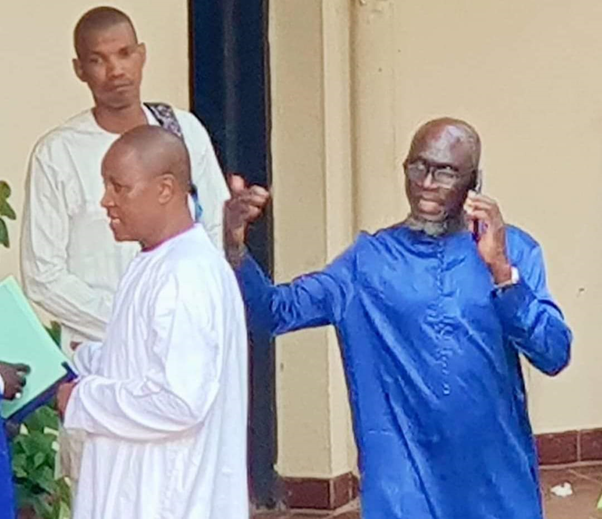By Kemeseng Sanneh (Kexx)
An employee of the Gambia Revenue Authority (GRA) on Monday, 4 December 2023 testified in the ongoing economic crimes and corruption case involving three senior health officials.
The accused persons are Muhammadou Lamin Jaiteh – Permanent Secretary of the Ministry of Health, Balla Kandeh – Programme Manager of the Malaria Control Programme and Omar Malleh Ceesay – Executive Director of the Health Promotion and Development Organization.
They were charged with eighteen (18) criminal charges. The charges were Official Corruption, Disobedience of Statutory Duty, Conspiracy, Economic Crimes, Forgery and Theft.
Ernest Anthony Mendy, a resident of old Yundum and a human resources professional at the Gambia Revenue Authority, testified as the second prosecution witness (PW2).
Mendy testified that he recognized the two accused persons – Omar Mallan Ceesay and Balla Kandeh. He said the two were his college mates and they all graduated together. He stated that after the college education, they co-founded a youth association called TAYAM (The Association of Youth Against Malaria) in 1997. When asked if he had met them outside of college, he mentioned that they worked together in TAYAM until it was transformed into an NGO called HePDO around 2005 or thereabouts.
Mendy further testified that at HePDO, the board members included himself, Fanta Jatta Sow – Chairperson, Sainey Badjie, Lamin Manneh, Sulayman Jammeh, Burama J.M. Mendy, Saibo Camara, and Balla Musa Joof. He stated that he couldn’t recall the vice chairperson. Additionally, he mentioned that the executive director of HePDO, who is Omar Mallan Ceesay (the second accused person), also served as the Secretary.
When asked to explain how HePDO operates, the witness described it as having two types of systems. He explained that there is a board of directors responsible for governance and policy matters. Mendy said the board’s role was to establish relevant policies in various areas such as administration and finance, provide policy direction, and advise the secretary on administrative and operational matters. He also mentioned that HePDO partnered with both governmental and non-governmental organisations, such as CRS Gambia and UNICEF.
Mendy confirmed that HePDO had a partnership with the Global Fund as a sub-recipient under CRS. He explained that HePDO and CRS had a Memorandum of Understanding (MOU) that outlined each party’s obligations, and the implementation of the agreement was bound by these obligations. The witness stated that the board of HePDO would review and approve MOUs.
Regarding partnerships with the Ministry of Health (MoH), Mendy stated that the partnership started when they were still called TAYAM and continued after the transformation into HePDO. He noted that the process for entering into partnerships and signing MOUs with the MoH followed the same procedure – the chairperson of the board approved the MOUs and the executive director’s second signature was also required.
Mendy clarified that while many MOUs were signed to establish partnerships subsequent contracts for implementing activities followed.
When asked about the nature of activities carried out by HePDO, Mendy explained that as a sub-recipient of CRS under the Global Fund, HePDO implemented activities related to the Malaria Control Program and the FGMC program in connection with UNICEF. He mentioned that the implementation was carried out by the secretariat, which had project managers and field coordinators responsible for direct implementation.
Mendy testified that the only way the organisation got access to funds from the Global Fund was through CRS.
He also mentioned that the board of HePDO met quarterly to discuss organization activities, implementation progress, staff matters, and other business agendas. He added that the minutes of the meetings were taken and shared.
During cross-examination by the defence counsel Lamin S. Camara, Mendy confirmed that he was a founder of TAYAM which was later called HePDO. He also stated that he was familiar with the operational arrangements of HePDO. When asked if HePDO was a public institution or non-governmental institution, Mendy clarified that it is an NGO and it is not bound by the GPPA (Gambia Public Procurement Authority) guidelines. However, he acknowledged that NGOs have their procurement guidelines to follow. With no further questions from Counsel Camara, Mendy was discharged. The case was adjourned to Tuesday (today) at 2:15 pm for the hearing of the testimony of the third

















